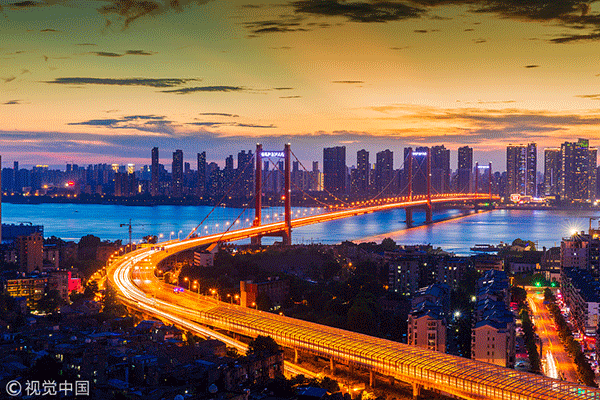Hubei

Overview
Hubei province lies in the middle reach of the Yangtze River, with an area of 186,000 square kilometers. The terrain of Hubei is high in the west and low in the east and wide open to the south, the Jianghan Plain.
Situated in Central China, Hubei features a subtropical monsoon climate. The average temperature in a year is about 15 C. The province has four distinct seasons with burning hot summer (June, July and August) and chilly winter (December, January and February).
Hubei had a total resident population of 59.02 million in 2017, of which the male population was 29.96 million, while female population was 29.05 million, accounting for 50.78 percent and 49.22 percent respectively.
The province is rich in agriculture, forestry and hydropower resources. Agriculture and fishery are well developed in Hubei, primarily with products such as paddy rice, wheat, ramie, cotton, silk, tea, orange, fish, and vegetable oil.

[Photo/VCG]
The construction of the Yangtze River Economic Belt and the Belt and Road Initiative has become an important national strategy to boost the green development along the Yangtze River. More preferential policies are expected to be granted to the provinces in Central China including Hubei.
In 2017, the province's GDP amounted to 3.65 trillion yuan ($535.39 billion), up 7.8 percent over the previous year. The fixed-asset investment of the whole society exceeded 3.1 trillion yuan, an increase of 11 percent year-on-year. The total social retail goods were valued at 1.74 trillion yuan, up 11.1 percent.
Pillar Industries
Hubei, the birthplace of modern industry in China, is one of the important old industrial bases and one of the three largest steel bases in our country. It has established a distinctive industrial system, including pillar industries such as automobile, iron and steel, petrochemical, food processing, equipment manufacturing, electronic information and textiles. Furthermore, the province is strong in the metallurgical industry, hydropower, shipbuilding and logistics.
1. Automobile Industry
With 50 years of construction and development, the automobile industry in Hubei province has established the industrial foundation with "one leading industry and two belts". "One leading industry" refers to taking the automobile industry as the leading role, and "two belts" refers to the two centralized belts, including automobile industry belts based on the Dongfeng Motor and a large technical equipment belt based on Yichang, Jinzhou, Wuhan and Huangshi.
2. Petrochemical Industry
Petrochemical industry, after years of development, has formed a manufacturing and construction system with large and middle scale enterprises as its backbone; petroleum extraction, petroleum refining, chemical industry for agricultural use, basic chemical raw materials and rubber processing as its leading role; and chemical industry research, education, design, geological exploration and installation and construction as its supporting role.
3. Textile Industry
Hubei is an important base for Chinese textile industry. At present, the province has formed a relatively complete industry chain of textile, including cotton textile, wool textile, gunny textile, dyeing, knitting, color weave, silk, chemical fiber, clothes, shoes and textile machinery.
4. Iron and steel
The iron and steel industry is one of the main industrial pillars of the local economy. The most renowned company in this sector is the Wuhan Iron and Steel Corporation. In recent years, WISCO has acquired large Chinese steel corporations to consolidate its strong position in China and abroad.
Advantages
Situated in Central China, Hubei has a unique geographical advantage. Taking Wuhan, the capital of Hubei, as the center of a circle, within 1,000 kilometers, people can reach Beijing and Tianjin in the north, Guangzhou and Hong Kong in the south, Shanghai, Hangzhou and Taipei in the east and Chongqing, Chengdu and Xi'an in the west, covering 70 percent of the large and medium sized cities in China.
Due to its central location in China, Hubei also has clear regional transportation advantages. The provincial government is promoting Wuhan, upgrading it to a modern city. The goal is to build a national logistics hub city with a good layout of modern logistic parks, logistic centers and distribution centers for both domestic and overseas markets.
Hubei is China's hydropower base with abundant water resources. It is also one of the most developed provinces in education and scientific research. There are over 120 higher education institutions including 85 colleges and universities. Among those are two of the top ten Universities in China: Wuhan University and Huazhong University of Science and Technology.
Hubei has a well-developed market distributing system. The wholesale markets at the producing and selling areas are scattered all over the province, connecting millions of small domestic productions with large, changeable markets.
Hubei has grown significantly as a tourist destination in China over the past few years. The famous Three Gorges scenic area along with the Three Gorges Dam is by far the most famous and well-visited tourist attraction in the province. Wudang Mountain, the Yellow Crane Tower in Wuhan and the Shennongjia Nature Reserve are also popular tourist spots.
Responsible Departments
1. Department of Commerce of Hubei Province
Contact:
Tel: 027-85774233
Address: Jinmao Building, No 8 North Jianghan Road, Wuhan, Hubei
Postcode: 430022
2. Hubei Association of Enterprises with Foreign Investment
Contact:
Tel/ Fax: 027-85778329
Address: 12th floor, Jinmao Building, No 8 North Jianghan Road, Wuhan, Hubei
Postcode: 430022
3. Wuhan Association of Enterprises with Foreign Investment
Contact:
Tel: 027-85808207
Fax: 027-85790584
Address: No 217 Taibei Road, Wuhan, Hubei
4. Wuhan Economic and Technological Development Zone (Hannan)
Contact:
Tel: +86(27) 84891110
Fax: +86(27) 84891110
Postcode: 430056
5. Wuhan East Lake High-tech Development Zone, National Innovation Demonstration Zone
Contact:
Tel: +86-027-87804115
Address: No 777 Gaoxin Avenue, Wuhan, Hubei
MOST POPULAR
- 1 China Daily's 'Shopping in China' platform appeals to intl audiences
- 2 China updates Catalogue of Encouraged Industries for Foreign Investment
- 3 Policies concerning expats, foreign enterprises in December 2025
- 4 China becomes the world's fourth manufacturing power
- 5 China ascends global higher education ranking







